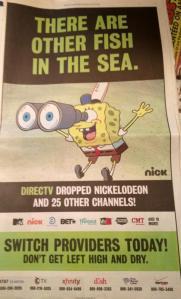If you aren’t aware, Viacom and DirecTV are in a major dispute. It centers around Viacom’s (owner of channels like MTV, VH1 and Nickelodeon) demands for payment increases – up to 30% more than what they originally were. DirecTV doesn’t want to make its subscribers pay that much more per channel (what Viacom says adds up to only “cents more per day”). If you aren’t up to speed, you can read all about the actual dispute over here.
What’s happening, though, is that this dispute is turning into a major public relations crisis for Viacom. Not only have they not owned up to the fact that they want more money for each of their channels, they’re doing it at a time when no one can really afford anything. That in itself is a mistake that makes an already huge corporation look greedier than the normal perception. Then, instead of reaching any kind of deal with DirecTV, they’re running a major campaign that puts all of the blame on DirecTV.
DirecTV doesn’t need to do anything in this situation. Viacom’s unwillingness is all the positive press DirecTV needs.

A full-page Viacom ad that appeared in the Sunday (July 15) New York Times. It actually encourages readers to switch providers.
The full page ad that appeared in July 15′s New York Times is one example of a poorly thought-out ad. Using Spongebob to play on readers’ emotions? Sketchy. The headline? “There are other fish in the sea.” Viacom’s image is being completely tarnished by this. It doesn’t come across as funny or as in a consumer’s best interest. Viacom seems to have lost sight of what they do, and that’s provide a service. It might not seem like the greatest or most necessary service, but their job is to entertain. These ads are far from entertaining.
Logging on to any Viacom-owned site is also nearly impossible now. Whether you’re trying to log on to MTV.com or Nickelodeon.com or even TeenNick.com, you, as a user, are assaulted by a minute-long video explaining the evils of DirecTV. Not wise, considering many of the users logging onto these sites are the teenagers and children in the household. And yes, while you can make the argument that these are the primary influencers in household buying decisions, I don’t think that’s the route to take with this campaign. Half of these kids probably don’t even know what a “provider” is. It’s a dirty situation, and playing with kids’ emotions like that isn’t a great business tactic.
Not only that, but social media’s backlash against Viacom is intense. This article on Examiner gives a solid rundown of the social media backlash. Viacom is going to need to accept that DirecTV is in the right here, especially as they have positioned themselves as the company looking out for their customers. Viacom hasn’t done that, and they’re going to be left flailing as a result. DirecTV has made themselves the company that cares, and Viacom is left looking greedy.
Hopefully, Viacom has a strong PR team ready to tackle this. Because so far, it looks as though they’ve done anything but.

